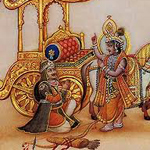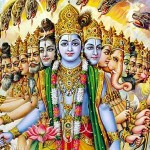 Now that Yoga philosophy, kirtan music, and Hinduism are becoming more popular in the United States, you may hear about Durga, Kali, Brahma, Shiva, Ganesh, and others. In India demigod worship is very common. The difference between worshiping demigods and worshiping the Supreme Lord Sri Krishna is clearly explained in the ancient scripture Srimad Bhagavad-gita.
Now that Yoga philosophy, kirtan music, and Hinduism are becoming more popular in the United States, you may hear about Durga, Kali, Brahma, Shiva, Ganesh, and others. In India demigod worship is very common. The difference between worshiping demigods and worshiping the Supreme Lord Sri Krishna is clearly explained in the ancient scripture Srimad Bhagavad-gita.

Arjuna inquires from the Supreme Lord Sri Krishna
The following article has been compiled from verses within Srimad Bhagavad-gita that clearly explain Sri Krishna’s relationship with the demigods and the results of demigod worship.
[Note: All verses cited in the article are spoken by the Supreme Lord Sri Krishna Himself unless noted otherwise.]
Question: Is Krishna a demigod?
Answer:
aham adir hi devanam maharshinam cha sarvasah
(Srimad Bhagavad-gita: 10.2)
“I alone am the origin of all those celestial beings (demigods) and sages.”
pasyami devams tava deva dehe
sarvams tatha bhuta-visesha-sanghan
brahmanam isam kamalasana-stham
rishims cha sarvan uragams cha divyan
(Srimad Bhagavad-gita: 11.15)
[Arjuna glorifies the universal form of Krishna:] “Oh Lord, I see within Your (universal) form all the demigods, all the varieties of embodied living entities, all the divine sages, all the serpents, Lord Siva and Lord Brahma seated on the lotus flower.”
tvam adi-devah purushah puranas
tvam asya visvasya param nidhanam
vettasi vedyam cha param cha dhama
tvaya tatam visvam ananta-rupa
(Srimad Bhagavad-gita: 11.38)
“You are the origin of all the demigods, the eternal Personality of Godhead and the sole refuge of this universe. You alone are the knower (of everything) and the knowable (all that is to be known). You are transcendental to the modes of material nature. Oh Lord of infinite forms, the entire universe is pervaded by You.”
Question: Where does the process of demigod worship come from?
Answer:
saha-yajnah prajah srishtva purovacha prajapatih
anena prasavishyadhvam esha vo ’stv ishta-kama-dhuk
devan bhavayatanena te deva bhavayantu vah
parasparam bhavayantah sreyah param avapsyatha
(Srimad Bhagavad-gita: 3.10-11)
“In the beginning (of creation), (by My arrangement) Lord Brahma manifested the progeny of the world, along with sacrifices. He instructed them thus: ‘Take shelter of this religious principle of sacrifice (yajna); prosper and flourish. May such sacrifice be the granter of all the things you desire. Satisfy the demigods by sacrifices, and may they satisfy you by bestowing upon you your desired ends. In this way, by mutually satisfying one another, you will be the gainers of great auspiciousness.’”
Question: What is the benefit of worshiping the demigods?
Answer:
ishtan bhogan hi vo deva dasyante yajna-bhavitah
tair dattan apradayaibhyo yo bhunkte stena eva sah
yajna-sishtasinah santo muchyante sarva-kilbishaih
bhunjate te tv agham papa ye pachanty atma-karanat
(Srimad Bhagavad-gita: 3.12-13)
“Satisfied by sacrifices, the demigods (My worldly representatives, the limbs of My universal form) will bestow upon you the ends you desire to enjoy. One who (selfishly) enjoys what is granted by the demigods without making (corresponding) offerings to them, is a thief. Virtuous persons are liberated from all sins arising from exploitation of other living entities by subsisting (solely) upon the remnants of sacrifices (that they make to the demigods). Yet those who prepare food (partake of the fruits of their actions) for their own selfish pleasure (alone) partake only of sin.”
Question: How do people become devoted to the demigods?
Answer:
yo yo yam yam tanum bhaktah sraddhayarchitum ichchhati
tasya tasyachalam sraddham tam eva vidadhamy aham
(Srimad Bhagavad-gita: 7.21)
“I (as the Supersoul dwelling within their heart) make firm the faith of any devotee who desires to faithfully worship any of the demigods (as all demigods are forms of Myself).”
sa taya sraddhaya yuktas tasyaradhanam ihate
labhate cha tatah kaman mayaiva vihitan hi tan
(Srimad Bhagavad-gita: 7.22)
“Being endowed with firm faith (by My grace), such devotees worship the demigods (of their choice) and obtain all their desired ends (from those demigods) by My arrangement (as I am also situated as the Supersoul within the hearts of the demigods).”
Question: Are persons who choose to worship the demigods intelligent? Is demigod worship the best way of life?
Answer:
antavat tu phalam tesham tad bhavaty alpa-medhasam
devan deva-yajo yanti mad-bhakta yanti mam api
(Srimad Bhagavad-gita: 7.23)
“Those who devote themselves to the demigods have only meagre intelligence and obtain (only) fruits that are temporary (invariably subject to destruction). The worshippers of the demigods go the (abode of) the demigods, but My devotees come to Me (My supra-mundane abode).”

Sri Krishna showed Arjuna His Universal Form
Question: Why do people take to demigod worship?
Answer:
kamais tais tair hrita-jnanah prapadyante ’nya-devatah
tam tam niyamam asthaya prakritya niyatah svaya
(Srimad Bhagavad-gita: 7.20)
“Persons whose conscience (jnanah) is stolen away (hrita) by material desires (kama) worship various demigods (gods other than Myself) and follow the particular rules and regulations (niyamas) of worship which correspond to the ends they desire, being governed by their own (conditioned) natures (prakriti).”
kankshantah karmanam siddhim yajanta iha devatah
kshipram hi manushe loke siddhir bhavati karma-ja
(Srimad Bhagavad-gita: 4.12)
“In the human world, persons who desire the fruits of their actions worship the various demigods (by making sacrifices unto them). (This is because) within the human world fruits produced by actions (such as enjoyment, entrance into heaven and so forth) materialize very quickly.”
Question: Do these sorts of persons ever surrender unto Sri Krishna Himself?
Answer:
na mam dushkritino mudhah prapadyante naradhamah
mayayapahrita-jnana asuram bhavam asritah
(Srimad Bhagavad-gita: 7.15)
“There are four types of wrongdoers who do not surrender unto Me: foolish persons (mudhas, karmis, those who, like animals, act solely for the purpose of enjoying the fruits of their actions); fallen persons (those who take up the practice of devotion but later reject it, considering it unavailing); those whose conscience (jnana) is stolen away by illusion (maya); and those who have adopted a demoniac temperament.”
yam imam pushpitam vacham pravadanty avipaschitah
veda-vada-ratah partha nanyad astiti vadinah
kamatmanah svarga-para janma-karma-phala-pradam
kriya-visesha-bahulam bhogaisvarya-gatim prati
bhogaisvarya-prasaktanam tayapahrita-chetasam
vyavasayatmika buddhih samadhau na vidhiyate
(Srimad Bhagavad-gita: 2.42-43)
“Oh Partha, foolish persons (avipaschitas—mudhas, karmis, those who cannot understand the true meaning or spiritual essence of the Vedic Scriptures—buddhi-yoga), who are attached to (secondary, materially connotative) interpretations of the Vedas (veda-vada-ratah), who are at heart ridden with material desire (kamatmanah—desirous of the fruits of their selfish actions) and who are solely intent upon heaven (svarga-para—who consider obtaining heavenly enjoyment to be the ultimate aim of human life) proclaim that there is nothing (of significance) other than the flowery (fleetingly pleasing) expressions (pushpitam vacha) of the (karma-kanda section of the) Vedas that prescribe various forms of sacrifices and so forth (kriya-visesha-bahulam) which grant one good birth, good fortune and one’s desired ends and act as a means to attain enjoyment and opulence (janma-karma-phala, bhoga-aisvarya). (Persons who advocate such a conception (vadinah) in effect contend that there is nothing beyond animals, food, children, heaven and so forth—that there is no Supreme Lord governing everything who should be served exclusively). The intelligence (buddhi) of such persons who are completely attached to (mundane) enjoyment and opulence (bhogaisvarya-prasakta) and whose conscience (chetasa) is stolen away (apahrita) by these flowery words within the Vedas (by material desire and the pursuit of the fruits of their actions) never gains resolute determination to serve (one-pointed, uninterruptible focus upon) the Supreme Lord (samadhi).”
Question: Do the worshipers of the demigods attain the same ends as persons who surrender exclusively unto the Supreme Lord Sri Krishna?
Answer:
yanti deva-vrata devan pitrin yanti pitri-vratah
bhutani yanti bhutejya yanti mad-yajino ’pi mam
(Srimad Bhagavad-gita: 9.25)
“The worshipers of the demigods go to (the plane of) the demigods, the worshipers of the ancestors go to (the plane of) the ancestors, the worshipers of ghosts go to (the plane of) the ghosts and those who worship Me come to Me (My supra-mundane abode)”
Question: What is the destiny of the worshipers of the demigods?
Answer:
trai-vidya mam soma-pah puta-papa
yajnair ishtva svar-gatim prarthayante
te punyam asadya surendra-lokam
asnanti divyan divi deva-bhogan
(Srimad Bhagavad-gita: 9.20)
“Persons who perform sacrifices described in the three Vedas (the Rig, Sama and Yajur Vedas) worship Me (in My forms as the various demigods). They drink soma after completing their sacrifices, become purified of sin and pray to ascend to the heavenly planets (the abodes of the demigods—svarga-loka). As a result of their piety, they reach the abode of Indra and the other demigods (surendra-loka) and enjoy all the wonderful pleasures of the demigods in heaven (divya deva-bhoga).”
te tam bhuktva svarga-lokam visalam
kshine punye martya-lokam visanti
evam trayi-dharmam anuprapanna
gatagatam kama-kama labhante
(Srimad Bhagavad-gita: 9.21)
“After enjoying the vast heavenly plane (svarga-loka), upon the exhaustion of their pious merits (punya) they return to the human plane (the mortal world—martya-loka) In this way, persons desiring material enjoyment who follow the Vedic rituals for demigod worship (simply) come and go—they achieve nothing more than continuing to revolve through the cycle of birth and death in this material world”
Question: What is the destiny of those who devote themselves exclusively to the Supreme Lord Sri Krishna?
Answer:
nirmana-moha jita-sanga-dosha
adhyatma-nitya vinivritta-kamah
dvandvair vimuktah sukha-duhkha-samjnair
gachchhanty amudhah padam avyayam tat
(Srimad Bhagavad-gita: 15.5)
“Those who are devoid of vanity (mana), illusion (absorption in falsity—moha) and the contamination of bad association (the association of ungodly, materialistic persons—duhsanga-dosha), devoted to the eternal religion of the soul (adhyatma-nitya), completely free from material desire (vinivritta-kamah), completely liberated from the dualities of happiness and distress (heat and cold, victory and defeat and so forth) and free from ignorance (amudhah—non-foolish) obtain entrance into the eternal (imperishable) abode (upon surrendering unto the Original Personality, the Supreme Lord, from whom the whole of the illusory material world has manifest).”
yad gatva na nivartante tad dhama paramam mama
(Srimad Bhagavad-gita: 15.6)
“Once such surrendered souls reach My supreme abode they never again return to the material world.”
